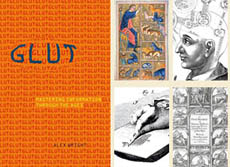smart mobs, flocking, and Googling UPC codes - an evening with Howard Rheingold
December 11, 2002
Last night, I went to see Howard Rheingold speak at BayCHI, promoting his new book Smart Mobs.
What I already knew about Howard Rheingold: that he was a certifiable eminence gris from back when people still used words like �Digerati� in earnest; that he was a major figure in the evolution of the Well; that he did a short-lived stint as the first editor of Hotwired; that he was friends with Kristee; and that he likes to wear hats. I had also worked briefly with Rheingold - from opposite coasts, without ever actually meeting - on the Deep Blue project, where his old company Electric Minds hosted our online discussion forums (which unfortunately are no longer available online).
Rheingold the person, it turns out, lives up to Rheingold the persona: treading a fine line between old school California Eccentric and new school Respected Internet Authority. There he was, tricked out in a black shirt decorated with Day-Glo moons and crescents, but with short hair and regular shoes - looking the part of latter day cyberhippie-turned-semi-famous-author. But no hat.
Rheingold spent most of the talk summarizing the book. In the no small Irony dept, I already pretty much knew exactly what he was going to say - not having read the book, or even a single book review, but purely by dint of blog-surfing (including Rheingold's own blog). Rheingold would probably say this proves his basic thesis: that falling thresholds to personal communication are transforming the way we interoperate with each other and with the culture at large.
Which all sounds obvious enough. And I will confess that I went in harboring a quiet suspicion that Rheingold's book might just turn out to be an exercise in the naked cashiering of a self-evident trend. But I'm happy to report that Rheingold has delved deeper than just observing the surface phenomena; the man does have something to say.
To recap his major points:
- Wireless devices are drastically lowering the barriers to personal communications, especially in developing countries (e.g. 1 in 8 Botswanans now has a cell phone)
- As those barriers lower, new and unexpected patterns of collective behavior will emerge - we are seeing the first signs of that phenomenon today with things like SMS "flocking" (where self-organizing groups of people will gravitate towards particular locations - for example the widely reported pattern of British girls stalking Prince William en masse via SMS messaging)
- These collective behaviors may sometimes be a good thing (as in recent mass protests against government corruption in the Philippines, brought about through an onslaught of viral text messaging); but they are by no means an inherently good thing (for example, the Nigerian Miss Universe pageant riots and subsequent mass killings were directly triggered through SMS messaging)
- The long-term consequences of these evolving behavior patterns are impossible to predict.
- One provocative prediction: that inanimate objects will inevitably start getting "smarter" about themselves (cue Semantic Web debates here) Rheingold shared a great anecdote about a friend who had jerry-rigged a UPC barcode scanner onto his PDA; allowing him to scan any product barcode, extract the product name, and pass that term directly into Google (he used the prototype to scan the barcode on a box of Kellogg's cereal directly into Google, whereupon he discovered a pending truth-in-advertising case against the product - how's that for consumer empowerment?)
While the talk itself may not have harbored too many surprises, I enjoyed the chance to reconcile Rheingold the person with the persona. I enjoyed his seemingly genuine - though judiciously guarded - optimism about the future.
Finally, if nothing else, Rheingold convinced me it may just be time to join the EFF.
File under: User Experience
_____________________« separated at birth? | sticking a fork in the zeitgeist »
GLUT:
Mastering Information Through the Ages
New Paperback Edition
“A penetrating and highly entertaining meditation on the information age and its historical roots.”
—Los Angeles Times
